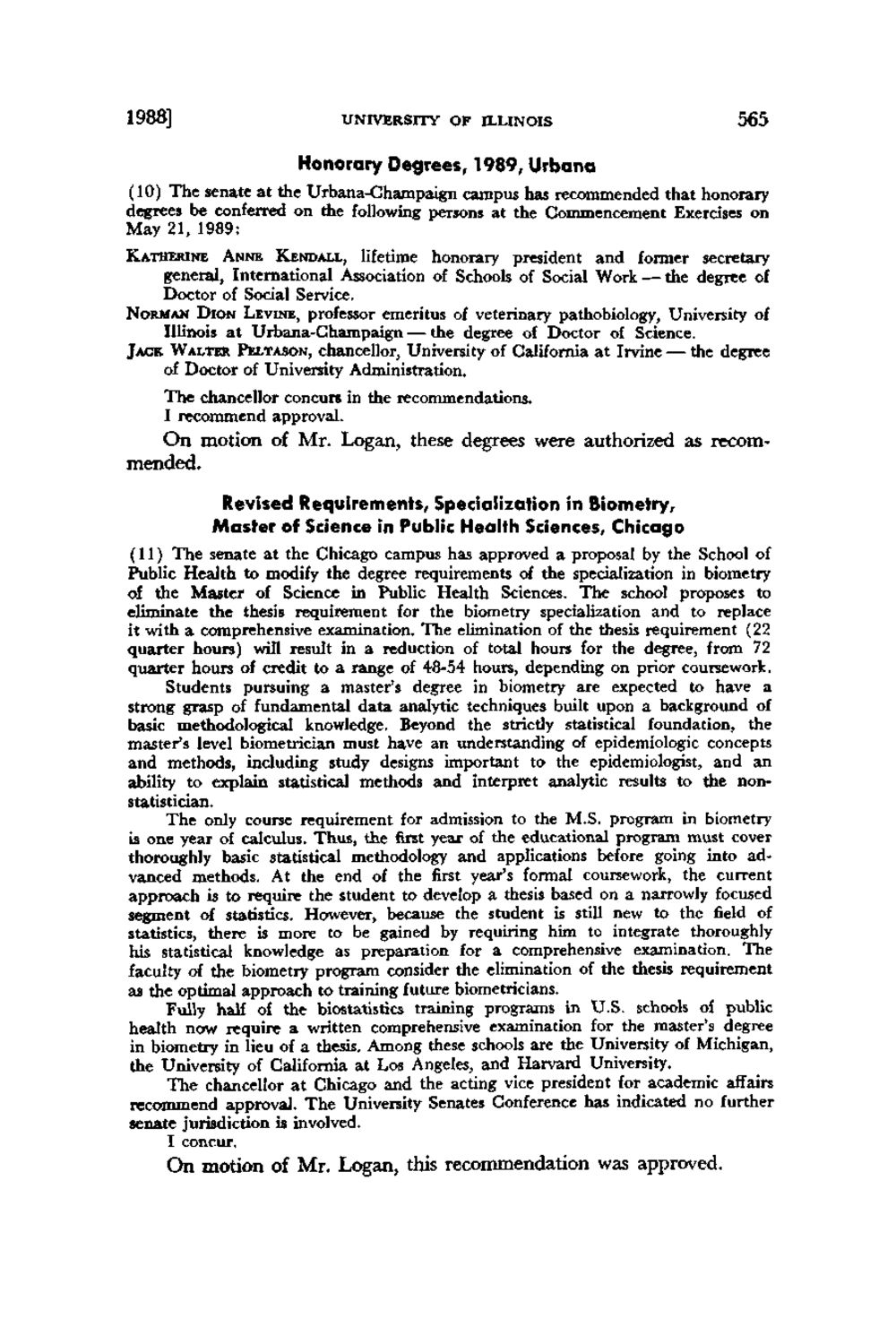Caption: Board of Trustees Minutes - 1988
This is a reduced-resolution page image for fast online browsing.

EXTRACTED TEXT FROM PAGE:
1988] UNIVERSITY OF ILLINOIS 565 Honorary Degrees, 1989, Urbana (10) T h e senate at the Urbana-Champaign campus has recommended that honorary degrees be conferred on the following persons at the Commencement Exercises on May 2 1 , 1989: KATHERINE ANNE KENDALL, lifetime honorary president and former secretary general, International Association of Schools of Social Work — the degree of Doctor of Social Service. NORMAN D I O N LEVINE, professor emeritus of veterinary pathobiology, University of Illinois a t Urbana-Champaign — the degree of Doctor of Science. JACK WALTER PELTASON, chancellor, University of California a t Irvine — the degree of Doctor of University Administration. The chancellor concurs in the recommendations. I recommend approval. O n m o t i o n of M r . L o g a n , t h e s e degrees w e r e a u t h o r i z e d a s r e c o m mended. Revised Requirements, Specialization in Biometry, Master of Science in Public Health Sciences, Chicago (11) T h e senate at the Chicago campus has approved a proposal by the School of Public Health to modify the degree requirements of the specialization in biometry of the Master of Science in Public Health Sciences. The school proposes to eliminate the thesis requirement for the biometry specialization and to replace it with a comprehensive examination. The elimination of the thesis requirement (22 quarter hours) will result in a reduction of total hours for the degree, from 72 quarter hours of credit to a range of 48-54 hours, depending on prior coursework. Students pursuing a master's degree in biometry are expected to have a strong grasp of fundamental data analytic techniques built upon a background of basic methodological knowledge. Beyond the strictly statistical foundation, the master's level biometrician must have an understanding of epidemiologic concepts and methods, including study designs important to the epidemiologist, and an ability to explain statistical methods and interpret analytic results to the nonstatistician. The only course requirement for admission to the M.S. program in biometry is one year of calculus. Thus, the first year of the educational program must cover thoroughly basic statistical methodology and applications before going into advanced methods. At the end of the first year's formal coursework, the current approach is to require the student to develop a thesis based on a narrowly focused segment of statistics. However, because the student is still new to the field of statistics, there is more to be gained by requiring him to integrate thoroughly his statistical knowledge as preparation for a comprehensive examination. The faculty of the biometry program consider the elimination of the thesis requirement as the optimal approach to training future biometricians. Fully half of the biostatistics training programs in U.S. schools of public health now require a written comprehensive examination for the master's degree in biometry in lieu of a thesis. Among these schools are the University of Michigan, the University of California at Los Angeles, and Harvard University. T h e chancellor a t Chicago and the acting vice president for academic affairs recommend approval. T h e University Senates Conference has indicated no further senate jurisdiction is involved. I concur. On motion of Mr. Logan, this recommendation was approved.
|